#africa center
Explore tagged Tumblr posts
Text
El latrocinio institucionalizado e internacionalizado por la élite marital sociata.
7 notes
·
View notes
Photo

Rema | “HEIS” Album Release
#Rema#HEIS#center of attention#spotlight#featured#artist#africa#afrobeats#fashion#drip#fit check#melanin
95 notes
·
View notes
Text
this is making me think about how gojo would absolutely be the one to force his students to make tiktoks w him. like can u imagine how excitedly yuuji would agree???? and megumi would just be in the corner plugging his ears or some shit bc he simply cannot listen to that 15 second clip of music any more lest he perish
#im embarrassed by how many times i watched this#i am losing my mindjaja#yuuta just barely being out of the frame so gojo can be front and center?#thats canon#this is the first thing gojo made him do when he got back from africa#m!posts#jujutsu kaisen#jjk#gojo#gojo satoru#okkotsu yuuta#yuuta#yuuji#itadori yuuji#megumi#fushiguro megumi
150 notes
·
View notes
Text
Some goods news for women
How Ivuna women farmers are transforming their lives through seed production
In Ivuna Village, Tanzania, a determined group of women leveraged Vikoba loans, mentorship, and improved sorghum seeds to transform their livelihoods, boost household incomes, and inspire others in their community
By Florian Ndyamukama February 4, 2025
“Five of us borrowed $100 from our Vikoba group and invested it in seed production. Not only did we repay the loan with interest, but we also made a profit,” says Skola Sichalwe, a member of an extraordinary group of women who are transforming their community in Ivuna Village, Momba District. Vikoba groups, grassroots savings and credit associations, operate as informal microfinance systems in rural communities, empowering members with access to small loans and promoting financial independence. These groups often provide a lifeline for women seeking financial stability and growth in rural areas. What began as small savings groups has blossomed into a powerful movement of women breaking barriers and creating a legacy of resilience, innovation, and success. These women—once skeptical about venturing into seed production—are now thriving entrepreneurs, producing quality sorghum seeds and inspiring others in their community to follow their lead. Their journey began with a chance encounter with Miss Zainab Hussein, a passionate seed producer and a youth champion. Her vision and mentorship planted the first seeds of change. “I used to think farming was just about survival,” says Pauline Martin. “But Zainab showed us that with the right knowledge and tools, farming can be a business; a way to change our lives.”
A leap of faith in seed production
Before venturing into the world of seed production, these women were members of Vikoba groups, pooling their savings to lend and borrow money. While this system was helpful for meeting immediate financial needs, it offered little opportunity for growth or long-term investment. Everything changed when Zainab Hussein, an experienced seed producer and youth champion, began attending their meetings. Zainab introduced the group to the potential of improved seeds and the opportunities in seed production. She explained how adopting high-quality sorghum seeds could significantly increase yields and profits, far exceeding the returns from what traditional grain farming could offer. Her visits became a game changer, sparking curiosity and inspiring action among the women. “Zainab’s dedication inspired us,” says Skola Sichalwe. “She didn’t just train us. She believed in us.” As a trainer, mentor, and role model, Zainab played a central role in their transformation. She guided the women through the complexities of seed production, teaching them essential planting techniques, helping them understand TOSCI regulations, and offering practical solutions to challenges they encountered along the way. “She showed us how seed production could not only improve yields but also become a profitable business,” recalls Pauline Martin.

Zainab Hussein, a passionate seed producer and mentor whose guidance and leadership inspired the women to venture into successful seed production and transform their lives. (Photo: CBCC)
Inspired by Zainab’s success, the women saw an opportunity to turn their savings into a sustainable investment. This journey was further supported by the establishment of Youth and Women Quality Centers (YWQCs) under the Center for Behavior Change Communication (CBCC) and the Accelerated Varietal Improvement and Seed Systems in Africa (AVISA) project through CIMMYT. The AVISA project, led by CIMMYT, piloted the YWQC model to address key challenges faced by rural farmers, including limited access to quality seeds, market linkages, and knowledge on improved farming practices. These community-led centers serve as hubs that enhance last-mile seed access by working with seed companies and local producers, ensuring a consistent supply of quality seed. They also facilitate market linkages by connecting farmers with aggregators and off-takers, improving market access and profitability. Additionally, YWQCs provide capacity-building initiatives, equipping youth and women with training in farming practices, local seed production, and business skills. The model further promotes collective action by encouraging farmers to form associations, strengthening their bargaining power and collective marketing efforts. These centers became hubs of opportunity, providing essential infrastructure and resources such as access to certified seeds, extensive training, and advanced farming technologies such as the multi-crop thresher through a cost-sharing arrangement. This technology not only improved efficiency but also ensured the quality of processed seeds, increasing its market value. The project also facilitated crucial linkages between the women and certified seed producers, ensuring they had access to high-quality inputs for their production. In some cases, the project even helped them find markets for their seeds, closing the loop and creating a sustainable business model. And so, they began the journey of seed production, transforming not only their own lives but also their community.

The women’s group plants sorghum using proper spacing techniques, a transformative practice essential for certified seed production, which they adopted after training by CBCC and mentorship from Zainab. (Photo: CBCC)
With loans from their Vikoba groups, they purchased quality seeds and accessed the tools, training, and market linkages provided by the YWQCs. “For years, we saved money but didn’t know what to invest in,” says Halima Kajela. “Seed production gave us a clear opportunity to grow.”
Challenges: A Test of Determination
The journey wasn’t without hurdles. Rodents feasted on the carefully spaced sorghum seeds, a new planting method the women had to adopt for certification. “Broadcasting seeds was easier, but seed production required precise planting and spacing,” Halima explains. “This made it harder to protect the seeds from pests and animals.” Excessive rain washed away seedlings, requiring several rounds of replanting. Cattle from neighboring farms often invaded their fields, causing further damage. Adopting good agronomic practices such as proper spacing, timely weeding, and regular inspections was initially difficult for these women, who were unaccustomed to the disciplined approach required in seed production. Despite these setbacks, the women persevered. With Zainab’s guidance and support from the YWQCs, they implemented solutions like using seed planters which saved time and effort during planting, knapsack sprayers helped combat pests and diseases, and multi-crop threshers simplified the post-harvest process. All these tools saved time and improved efficiency.
Triumph in the fields
And their hard work paid off. In their very first season, the women achieved remarkable success, producing three tons of TARISOR 2, an improved sorghum variety. This achievement not only set them apart from other first-time producers in the district, but also marked the beginning of a transformative journey.

Before the arrival of multi-crop thresher, the women relied on traditional methods to thresh sorghum. Their dedication laid the foundation for their transformation into successful seed producers. (Photo: CBCC)
The impact of their efforts went far beyond the impressive harvest. Ten women became officially registered seed producers with the Tanzania Official Seed Certification Institute (TOSCI), gaining recognition and credibility in the seed production business. Two members received specialized training in seed and fertilizer dealership, equipping them to expand their services and outreach to the community. Four women ventured into distributing essential agricultural inputs, such as maize seeds and hermetic bags, further diversifying their income streams and supporting local farmers. Recognizing the need for efficient post-harvest processing, the group collectively contributed to the purchase of a multi-crop thresher. This crucial investment significantly streamlined their operations, reducing labor and ensuring higher-quality processed seeds. Their efforts quickly translated into financial rewards. Within a short time, they sold one ton of their high-quality seeds, earning over $700. As word of their success spread, demand for their seeds continued to grow, promising even greater opportunities in the seasons ahead.
A ripple effect of change
Their success has had a profound effect on their community. The women’s achievements have earned them respect, and their influence is inspiring others to follow in their footsteps. “Before this, I didn’t believe in seed production,” says Pauline. “But after seeing Zainab’s success and what we achieved, even my husband now supports me fully in this venture.” Their impact extends beyond their fields. Other Vikoba groups have invited them to share their knowledge on seed production, and 10 new women have expressed interest in joining the initiative. By making improved sorghum varieties more accessible, they’ve also helped increase production and reduce food insecurity in their village.
Looking ahead: Planting seeds for the future
Inspired by their success, the women have ambitious plans. With a clear vision for the future, they are determined to expand their seed production enterprise and bring its benefits to a wider community. One of their primary goals is to extend their production to neighboring wards, such as Mkomba. To make their knowledge and improved seed varieties more accessible, they plan to establish demonstration plots closer to the village center. These plots will serve as practical learning sites, allowing more farmers to experience the advantages of using certified seeds and adopting best practices. “The demand for quality seeds is growing,” says Halima Kajela, one of the group members. “We’re committed to meeting that demand and helping more farmers improve their yields.” They are also exploring ways to diversify their operations. They aim to invest in distributing other agricultural inputs and post-harvest services such as threshing, to support farmers in the community and generate additional income. For these women, seed production isn’t just a business—it’s a symbol of empowerment.
#tanzania#Women in agriculture#Youth and Women Quality Centers (YWQCs)#Accelerated Varietal Improvement and Seed Systems in Africa (AVISA)#Sorghum#Tanzania Official Seed Certification Institute (TOSCI)
9 notes
·
View notes
Text

Women carry baskets of goods through the narrow streets of Kotaka, Mali. Mali, which spans an area between the Sahara Desert and the Niger River delta, has been a key trading center for many African civilizations.
Photo: JAMES L. STANFIELD
52 notes
·
View notes
Text
youtube
Pangolins are amazing, bizarre, adorable creatures, but due to the demand for their scales on the illegal market, they’re also the most trafficked animal in the world. In order to turn the tide, wildlife veterinarian Elias Mubobo knows the solution rests in the hands of the local community — many of whom have never seen a pangolin in the wild.
Native to Central and Southern Africa, pangolins feed exclusively and voraciously on ants and termites, and they’re perfectly specialized for this type of hunt. They’re the only scaled mammal on Earth. To the local community, spotting a pangolin is a sign of a bountiful harvest and abundant rainfall. But it’s their most defining feature — their scales — that make them the target of illegal animal traders seeking the scales for use in traditional medicine. Hundreds of thousands of pangolins are illegally trafficked each year.
Wildlife veterinarian Elias Mubobo grew up near Gorongosa National Park in Mozambique — known as “nature’s living laboratory” and true haven for community-based conservation — but still, he had never seen a pangolin during his youth. Now, many years later, Elais works as a wildlife veterinarian in Gorongosa and helps rehabilitate pangolins to be reintroduced back into the surrounding Park. His work also includes outreach to local children to rally community support in protecting pangolins they spot in the wild — and the efforts are working. So far, Elias’s Pangolin Rehabilitation Center has received 101 pangolins, 80 of which came from the illegal poaching market, and 21 that we received voluntarily from the people who live around Gorongosa National Park.
#Nature on PBS#wild hope#solarpunk#Africa#Mozambique#pangolins#Pangolin#Elias Mubobo#wildlife veterinarian#Gorongosa National Park#endangered species#animal trafficking#Pangolin Rehabilitation Center#Youtube
10 notes
·
View notes
Text
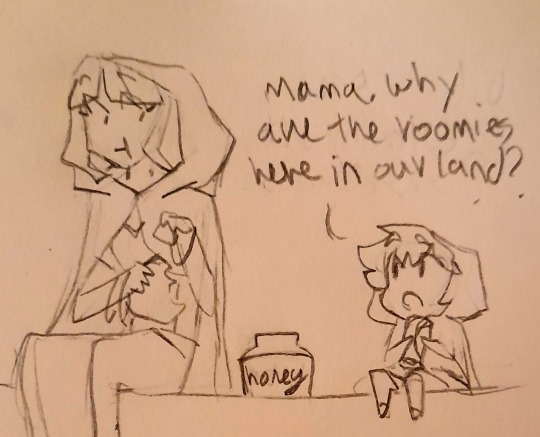
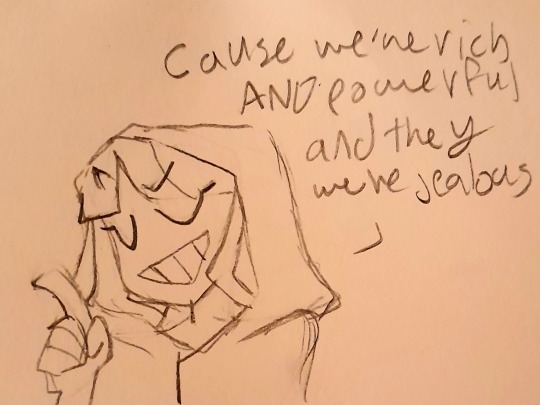
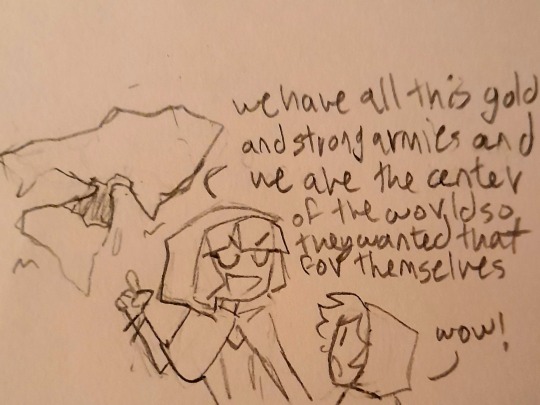
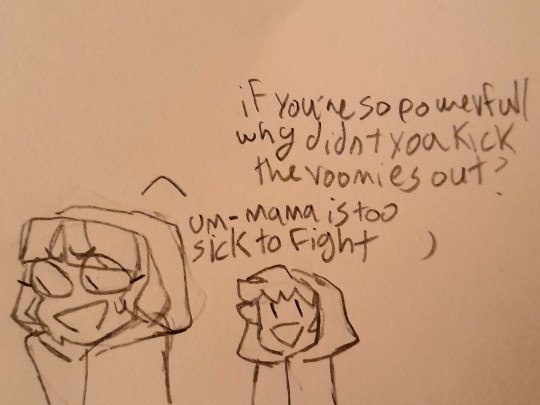
Sorry if this feels like pro Egypt propaganda she's just stuck in the past
Prev | Next
#don't factcheck my map i just drew general shapes based on memory#on the center of the world thing Egypt isn't really the centre of the world#it's just kinda the center of Africa Asia and Europe which to the ppl in the ancient times of pre americas is basically the whole world#also I'm not an expert on historical honey jars so they get a generic winny the boo honey jar#still not sure what to call this silly little fanfiction#hetalia#aph#hws#aph egypt#hws egypt#aph ancient egypt#hws ancient egypt#egytalia#blue's doodles
22 notes
·
View notes
Text






#hrw#human rights watch#sudan#kordofan#feminism#nuba mountains#Highlighting hrrds bc they’re I know they focus on the nuba mountains but if someone knows others that center this region please mssg me#sudan war#middle east#signal boost#fundraiser#mutual aid#east africa#keep eyes on sudan
2 notes
·
View notes
Text

#pew research center#latin america#North America#christians#muslims#islam#christianity#hindus#hinduism#judaism#buddhism#buddhists#africa#europe#Religion
8 notes
·
View notes
Text
do other countries even have little shows about their police task forces ???
#just saw a show for navy seals and i was like oh wait#not just about cops anymore . right#like i havent WATCHED television in years i dont keep up with new shows#but every now and then ill catch it and there are still new shows being produced about these fucking things#its like why are there five thousand shows about this in the usa...... does china have a bunch of hit TV shows about precincts ???#does brazil? does south africa ? does egypt? does greece? does scotland ?#does anywhere else do this#because im feeling like its no#detective shows is a whole other field. a detetctive is not a cop. cops have been at times assigned as detective. given the moniker#but you dont have to be an officer to detect.#so if there are shows about detetctives and sometimes the police show up i wouldnt say that counts#im talking about shows centered in precincts and military operations#its weird...#idk 💕
2 notes
·
View notes
Video
youtube
Kenya gives EastAfrica earthquakes with these mega projects|2024 @Kimlud
#youtube#kimlud#Kenya gives EastAfrica earthquakes#mega projects#infrastructure#architecture#innovation#housing#data center#routes#railways#kenya#nairobi#mombassa#east africa#africa
2 notes
·
View notes
Text
I love that John when he was drawing the world for Lord Yoshi, drew Africa first—at the center.
3 notes
·
View notes
Text
it is very strange to hear the education of someone who was brought up in fundamentalist circles and its like... actually this is the same stuff we’re told in american public school education
#brie rambles#the centering of the united states and unnamed people w.out saying hey the founding fathers suck and so does this country#like. we got. the bare minimum of certain other countries histories... like... medieval and rennaisance england. but like. barely.#and a quick sweep over ancient greece and rome.#but other than that it was. a slow rehashing of the same points in the united states but none actually hitting on the truth of the matter#like. even we got the very lightest hint in africa but it was the extent of watching hotel rwanda and mentioning blood diamonds#but still not. touching on how god awful the united states is and its complicity in so many war crimes#i could go on and on but the tldr is im just. my god i hate the school system here so much#history in this country is especially bad like my god.#and ppl wanna center it like. oh no its just the south w this education#i was literally in one of the most so-called progressive states education is just shit all over this country
1 note
·
View note
Text

Wow. OC basically admitted that judging a nation or gov't character has fuck-all to do with their integrity or actions, just whether they're using "the RIGHT language."
As Ronald W. Dworkin pointed out in his article The New American Anarchists:
“Self-esteem,” “negative self-image,” and “self-improvement.”
All these words can exist without being connected to anything that does exist. They have no well-defined cognitive content. They lend themselves to illusion because a person can project his or her own desires, hate, and fears onto them. They can mean whatever the person says they mean...
Radicalized knowledge workers reveal a similar trend, spending a large amount of time, both at work and at home, on social media...
Rahman [a BLM supporter] spent much of her life amid abstract concepts. She spoke “the language of abolitionist Twitter,” one writer observed. She was “steeped in the language of social justice and racial politics.” Ill-defined terms such as “race,” “gender,” “LGBTQI,” and “environmentalism” seem to have shaped her crude perception of reality...
The old American students who celebrated the purposeful killing of innocent Israeli civilians revealed a similar obsession with abstract words, constantly referring to phrases such as “colonialism,” “apartheid,” “humanitarian,” and “identity.” The words reflect the same creepy simplicity of mind that chills the blood.
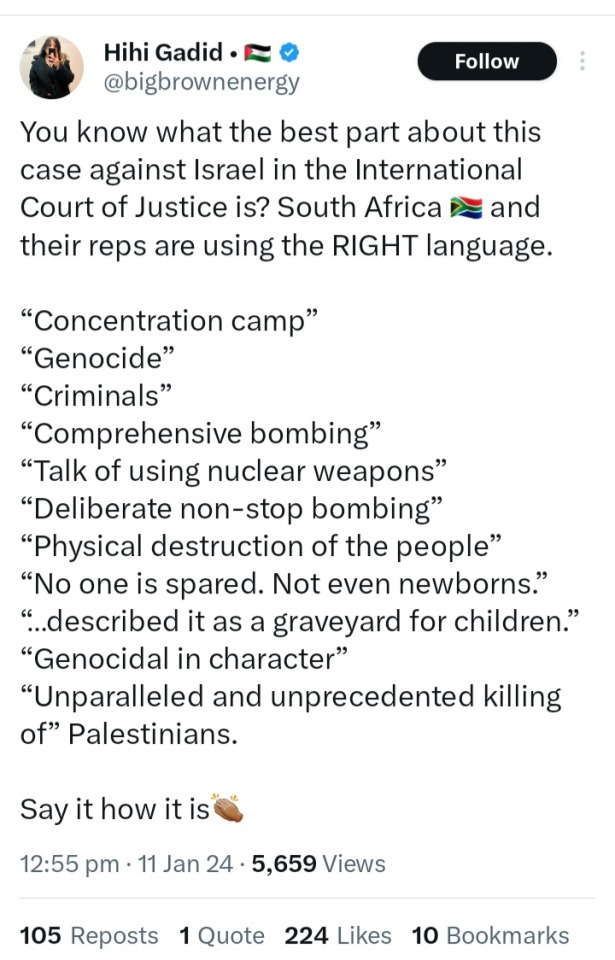
#leftist hypocrisy#leftist antisemitism#the new american anarchist#double standards#south africa#darfur#darfur genocide#russia#ukraine#russian war crimes#hamas war crimes#hamas is isis#hamas is evil#south africa is a joke#they cozy up to dictators and genocidal butchers and slavers right left and center#but since they use 'the right language' to condemn the ONE jewish nation on earth they're suddenly the good guys?#fuck off with that#fuck off with that shit#social justice#leftist social justice is a joke
50K notes
·
View notes
Text





We, at Manish Corporation, value our clients and strive to not only foresee their needs but also provide world-class services along with top-quality products.
#Building Materials Suppliers in South Africa#Rolling Mill Machine Parts Exporter in India#Rolling Mill Mechanical Machinery Exporter in South Africa#Algeria#Senegal#Mali#Coast#Nigeria#Libya#Angola#Namibia#Uganda#Chad#Mauritania#Egypt#Sudan#Ghana#Niger#South Africa#Ethiopia#Kenya#Botswana#Tanzania#Center African Republic#Congo#Madagascar#Mozambique
0 notes
Text
Coca-Cola is now on the official BDS boycott list!
From the website:
November 2024
1) Why?
Because Coca-Cola is implicated in Israeli war crimes.
According to research by WhoProfits, the Central Beverage Company, known as Coca-Cola Israel, which is the exclusive franchisee of the Coca-Cola Company in Israel, “operates a regional distribution center and cooling houses in the [Israeli] Atarot Settlement Industrial Zone.” Furthermore, its subsidiary, Tabor Winery, “produces wines from grapes sourced from vineyards located on occupied land in settlements in the West Bank and Syrian Golan.”
The International Court of Justice affirmed in July 2024 that Israel’s entire occupation of Gaza and the West Bank, including East Jerusalem, is illegal, as are all Israeli settlements built on occupied land. As Israeli settlements – on occupied Palestinian and Syrian land – are considered war crimes under international law, Coke is complicit in a war crime.
Corporations that are implicated in the commission of international crimes connected to Israel’s unlawful occupation, racial segregation and apartheid regime - within or beyond the Palestinian territories occupied in 1967 - are all complicit and must be held accountable. Direct complicity includes military, logistical, intelligence, financial and infrastructure support. The corporations, as well as their boards of directors and executives, may face criminal liability for this complicity.
Local alternatives are popping up worldwide to substitute Coca-Cola, an unnecessary and replaceable beverage
Local alternatives to Coca-Cola have been gaining market share across the world, including in Palestine, China, Bangladesh, Sweden, Egypt, India, South Africa, Turkey, Lebanon and elsewhere.
2) Why NOW?
The BDS movement has always considered Coca-Cola boycottable but has not prioritized it as a target based on its careful and strategic target-selection criteria, so why endorse the Coke boycott now?
Human rights and health activists, among many others, have been campaigning against Coca-Cola and similarly complicit corporations for decades, including grassroots drives targeting the company for its complicity in Israel’s gross violations of Palestinian human rights.
During Israel’s ongoing, livestreamed genocide, Israeli soldiers have often been pictured with Coke cans, donated to them by various genocide-enabling groups. This has provoked even more anger against the company, particularly given that Israel is starving 2.3 million Palestinians in the occupied and besieged Gaza Strip, severely limiting their access to clean water and, as a result, inducing the mass spread of contagious diseases.
Given this context, Palestinian activists in Gaza and many BDS activists in the Arab world, in many Muslim-majority countries, and in some European countries as well, have called on the BDS movement to add Coke to its priority targets.
The BDS movement had previously targeted General Mills for its manufacturing of Pillsbury products in the illegal Atarot Settlement Industrial Zone - the same Zone where the Coke facility operates. Thanks to effective BDS campaigning, we won the demand for General Mills to end its business in Atarot. We know a campaign against Coke is winnable too.
Based on all the above, and given Coke’s large contribution (through business-as-usual and taxes) to Israel’s war chest during the genocide, the Palestinian BDS National Committee (BNC), the largest Palestinian coalition leading the global BDS movement, has endorsed the grassroots, organic #BoycottCoke campaigns to pressure the company to end its complicity in Israel’s illegal occupation, apartheid and genocide.
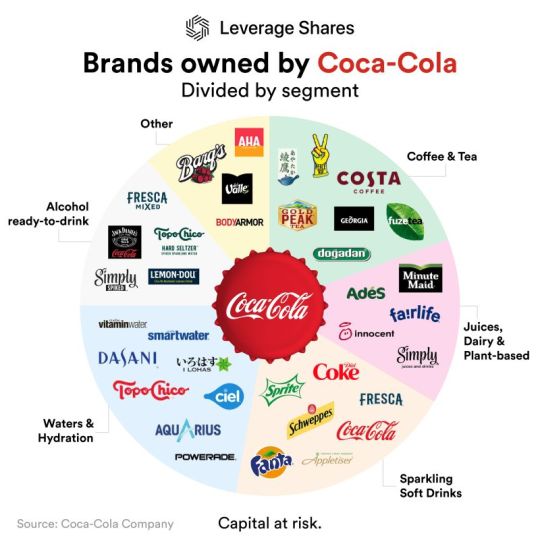
UPDATED VERSION!!!!
18K notes
·
View notes